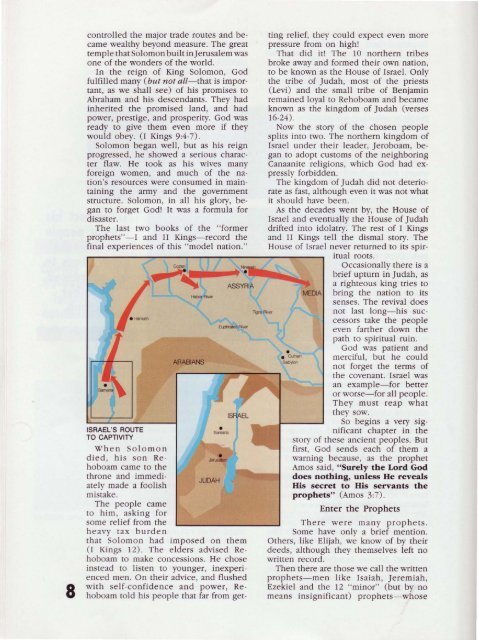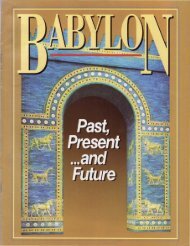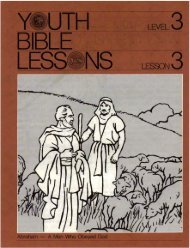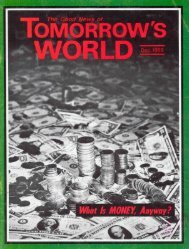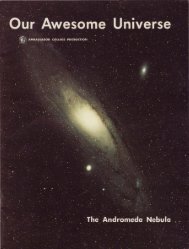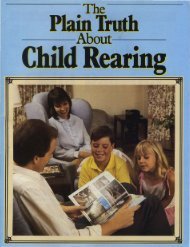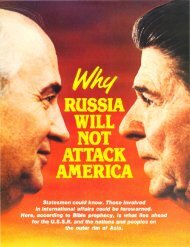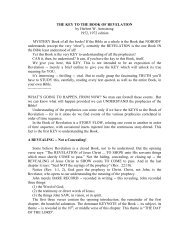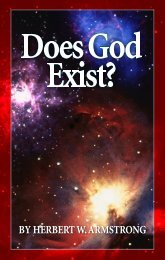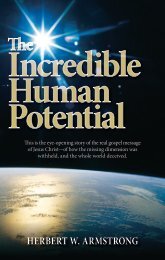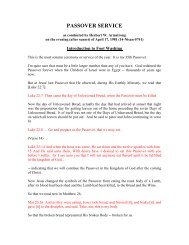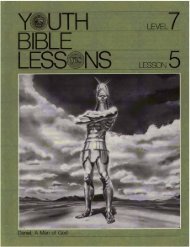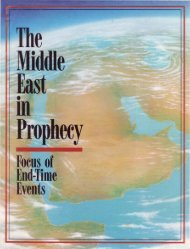Introduction to Prophecy - Church of God - NEO
Introduction to Prophecy - Church of God - NEO
Introduction to Prophecy - Church of God - NEO
You also want an ePaper? Increase the reach of your titles
YUMPU automatically turns print PDFs into web optimized ePapers that Google loves.
8controlled the major trade routes and becamewealthy beyond measure. The greattemple that Solomon built inJ erusalem wasone <strong>of</strong> the wonders <strong>of</strong> the world.In the reign <strong>of</strong> King Solomon, <strong>God</strong>fulfilled many (but not all-that is important,as we shall see) <strong>of</strong> his promises <strong>to</strong>Abraham and his descendants. They hadinherited the promised land, and hadpower, prestige, and prosperity. <strong>God</strong> wasready <strong>to</strong> give them even more if theywould obey. (I Kings 9:4-7).Solomon began well, but as his reignprogressed, he showed a serious characterflaw. He <strong>to</strong>ok as his wives manyforeign women, and much <strong>of</strong> the nation'sresources were consumed in maintainingthe army and the governmentstructure. Solomon, in all his glory, began<strong>to</strong> forget <strong>God</strong>! It was a formula fordisaster.The last two books <strong>of</strong> the "formerprophets"-I and II Kings- record thefinal experiences <strong>of</strong> this "model nation."ISRAEL'S ROUTETO CAPTIVITYWhen Solomondied, his son Rehoboamcame <strong>to</strong> thethrone and immediatelymade a foolishmistake.The people came<strong>to</strong> him, asking forsome relief from theheavy tax burdenHaber RiverARABIANSSamana •-•JUDAHEup/Yates Riverr9"~('Werthat Solomon had imposed on them(I Kings 12). The elders advised Rehoboam<strong>to</strong> make concessions. He choseinstead <strong>to</strong> listen <strong>to</strong> younger, inexperiencedmen. On their advice, and flushedwith self-confidence and power, Re hoboam <strong>to</strong>ld his people that far from gettingrelief, they could expect even morepressure from on high!That did it! The 10 northern tribesbroke away and formed their own nation,<strong>to</strong> be known as the House <strong>of</strong> Israel. Onlythe tribe <strong>of</strong> Judah, most <strong>of</strong> the priests(Levi) and the small tribe <strong>of</strong> Benjaminremained loyal <strong>to</strong> Rehoboam and becameknown as the kingdom <strong>of</strong> Judah (verses16-24).Now the s<strong>to</strong>ry <strong>of</strong> the chosen peoplesplits in<strong>to</strong> two. The northern kingdom <strong>of</strong>Israel under their leader, Jeroboam, began<strong>to</strong> adopt cus<strong>to</strong>ms <strong>of</strong> the neighboringCanaanite religions, which <strong>God</strong> had expresslyforbidden.The kingdom <strong>of</strong> Judah did not deteriorateas fast, although even it was not whatit should have been.As the decades went by, the House <strong>of</strong>Israel and eventually the House <strong>of</strong> Judahdrifted in<strong>to</strong> idolatry. The rest <strong>of</strong> I Kingsand II Kings tell the dismal s<strong>to</strong>ry. TheHouse <strong>of</strong> Israel never returned <strong>to</strong> its spiritualroots.Occasionally there is abrief upturn in Judah, asa righteous king tries <strong>to</strong>bring the nation <strong>to</strong> itssenses. The revival doesnot last long- his successorstake the peopleeven farther down thepath <strong>to</strong> spiritual ruin.<strong>God</strong> was patient andmerciful, but he couldnot forget the terms <strong>of</strong>the covenant. Israel wasan example-for betteror worse-for all people.They must reap whatthey sow.So begins a very significantchapter in thes<strong>to</strong>ry <strong>of</strong> these ancient peoples. Butfirst, <strong>God</strong> sends each <strong>of</strong> them awarning because, as the prophetAmos said, "Surely the Lord <strong>God</strong>does nothing, unless He revealsHis secret <strong>to</strong> His servants theprophets" (Amos 3:7).Enter the ProphetsThere were many prophets.Some have only a brief mention.Others, like Elijah, we know <strong>of</strong> by theirdeeds, although they themselves left nowritten record.Then there are those we call the writtenprophets-men like Isaiah, Jeremiah,Ezekiel and the 12 "minor" (but by nomeans insignificant) prophets- whose


